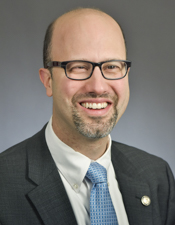House panel OKs bill to expand affordable child care, provide learning opportunities for infants
A proposal to make child care more affordable, help child care providers and provide learning opportunities to the youngest Minnesotans, cleared its first hurdle Thursday.
Following a brief discussion about the relative merits and missed opportunities, the House Early Childhood Finance and Policy Committee voted 8-3 along party lines to approve HF4735, after adopting a delete-all amendment.
Sponsored by Rep. Dave Pinto (DFL-St. Paul), the omnibus early childhood finance and policy bill next goes to the House Ways and Means Committee.
Its key focus, Pinto said, is early child care and learning.
The bill seeks to expand access to affordable child care by broadening the definition of family to include foster care families, relative custodians and successor custodians. It would also increase the child care reimbursement rate to providers and create a bonus program for licensed family child care providers and legal nonlicensed providers who care for infants.
[MORE: View a nonpartisan House Research Department summary]
The bill also would establish a grant program to help enhance and diversify the early childhood workforce.
Total General Fund appropriations for the 2022-23 biennium would be $771 million, including $250 million in new money.
[MORE: View the spreadsheet]
Rep. Ami Wazlawik (DFL-White Bear Township) called the bill a comprehensive investment that would bear positive outcomes for society as a whole in the future. By focusing on development of infants and their critical needs and by providing the necessary resources, the bill would help parents and care providers spot mental, health and educational problems of the young children before they become acute.
The proposals address an ongoing crisis of epic proportions that affect families, businesses and the general economy in the state, said Rep. Jim Davnie (DFL-Mpls). Lack of affordable child care prevents parents from joining the workforce, which in turn affects the state’s economy because businesses can’t find workers to fill the jobs they have. This bill is an investment in Minnesota workers, businesses and economy, he said.
Citing several examples of fraud in child care and welfare programs, Rep. Mary Franson (R-Alexandria) is concerned about increasing provider rates without putting adequate safeguards in place. She is also critical of the bill’s long-term funding for the child care stabilization grant program — a temporary expedient during the COVID-19 crisis — without what she believes are necessary safeguards.
“You have surrendered our legislative and fiscal authority to the executive branch, which they will use to pick and choose the child care providers they want to help,” Franson said.
Rep. Tony Jurgens (R-Cottage Grove) said the bill’s recommendations for group size and staff-to-child-ratio changes under various emergency conditions could be made permanent to give more flexibility to child care service providers.
Related Articles
Search Session Daily
Advanced Search OptionsPriority Dailies
Speaker Emerita Melissa Hortman, husband killed in attack
By HPIS Staff House Speaker Emerita Melissa Hortman (DFL-Brooklyn Park) and her husband, Mark, were fatally shot in their home early Saturday morning.
Gov. Tim Walz announced the news dur...
House Speaker Emerita Melissa Hortman (DFL-Brooklyn Park) and her husband, Mark, were fatally shot in their home early Saturday morning.
Gov. Tim Walz announced the news dur...
Lawmakers deliver budget bills to governor's desk in one-day special session
By Mike Cook About that talk of needing all 21 hours left in a legislative day to complete a special session?
House members were more than up to the challenge Monday. Beginning at 10 a.m...
About that talk of needing all 21 hours left in a legislative day to complete a special session?
House members were more than up to the challenge Monday. Beginning at 10 a.m...
